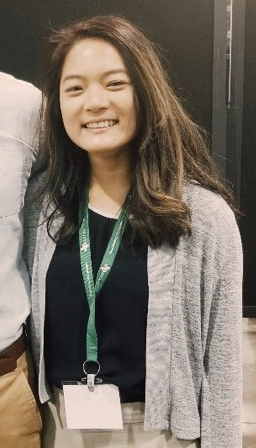
We are pleased to introduce Grace Le, a student at Cornell Tech who spent several months at the beginning of the year working with our colleague Alex Sigaras, M.S., Assistant Professor of Research in Physiology and Biophysics, and director of the EIPM AI-XR Lab. We hope you enjoy learning more about her background and research interests.
Please tell our readers a little bit about yourself.
My name is Grace. I’m a first-generation American. I’m from Oklahoma. My parents are educators, my dad is a professor and my mom is a physician. They gave everything to me, and I had a community growing up that accepted and loved me. I’m very thankful for my education and the support of my parents. I was exposed to science at an early age, and I fell in love with it. Therefore, I went to the University of Oklahoma majoring in mathematics and biomedical engineering under pre-med with a minor in computer science.
After interning at big pharmaceutical companies, I was exposed to tech and fell in love with it. In 2020, I applied to Cornell Tech’s computer and information science program, with a concentration in Health Technology because I was curious about the intersection of technology, healthcare, business, and design.
What are your professional aspirations?
Before college, I had every intention of going to medical school. Practicing medicine was one of the most direct ways I could impact the lives of others. However, I had this inescapable curiosity for the intersection of technology, business, and design, and was drawn to the gratification that comes with building things to help many people. At Cornell, I discovered various ways to impact healthcare outside of traditional medicine. My goal is to become a physician innovator.
How did you find out about the opportunity to work with Alex in our AI-XR lab?
I learned about Alex through Professor Oliver Elemento, Ph.D., the Director of the Englander Institute for Precision Medicine. After Professor Elemento found that my skillsets might be helpful in Alex’s research, I was fortunate enough to be introduced to Alex.
Please tell me about your work in the AI-XR lab?
My work in AI-XR lab started in January 2022 and ended in May 2022. I worked on Holograph, a graph visualization application in mixed reality that aims to help researchers identify patterns in cancer/drug networks. I had the honor to create and port features from HoloLens 1 to HoloLens 2 and Oculus 2.
What technical challenges, if any, did you have to overcome in this work?
A technical challenge I had while working under Alex was my unfamiliarity with C# and Unity. Despite my lack of experience with the software and language, I was able to use my existing knowledge of other object-oriented programming languages including C++, Java, C, TypeScript, and Python to quickly pick up the skills needed to develop features in Unity with Alex’s help.
Because of Alex’s supervision and countless hours spent training me, I was able to adapt quickly and am now confident with using Unity. I also spent time familiarizing myself with the Oculus 2 by playing various games, in an attempt to learn features developed by more experienced developers. From numerous journal clubs that Alex held in VR and in person, I learned how AR/VR can fail and how it can also play a huge role in education and medicine. In the end, I finished porting features from HoloLens 1 to HoloLens 2 and Oculus 2. From this experience, I learned a lot from my mentors and gained the confidence to navigate ambiguity, take risks, and creatively problem-solve. Over time, I have come to appreciate and value my skill set.
What excited you about this work?
From working with Alex and EIPM, I am more optimistic about the application of AR in healthcare. I think that there is a lot of potential in using AR for educational purposes, as well as the discovery stage of pharmaceutical development/research, and many more. I am excited to see where AR can go!
How might this experience benefit your future research and career?
\Before joining Alex’s lab, I was very skeptical about AR. However, after working with Alex, I understand the impact and value AR creates, especially in medicine and education. This encourages me to pursue AR/VR research in the future!
Would you encourage others to work with Alex in our AI-XR lab?
I would very much encourage others to work with Alex for many reasons. Alex is the best mentor and supervisor I have had during my time here at Cornell Tech. Alex is not only a great professor and developer, but he is willing to spend a lot of time helping his students even though he is extremely busy. An example I have is one weekend around finals week, I was in the lab struggling to get items in the menu clickable, so I pinged Alex on slack. Knowing that I had put in a lot of work and how stressed I was, Alex decided to come into the lab and spent hours on a weekend to help me troubleshoot the problem and make sure I understood the concepts. I am extremely thankful for Alex’s dedication to teaching his students and making sure they succeed. Therefore, I cannot recommend Alex enough to students who want to pursue XR research!
Is there anything else you’d like to share with our readers?
I just want to thank Alex for this opportunity and Dr. Olivier Elemento for introducing me to Alex, as well as students in the lab!
# # #
